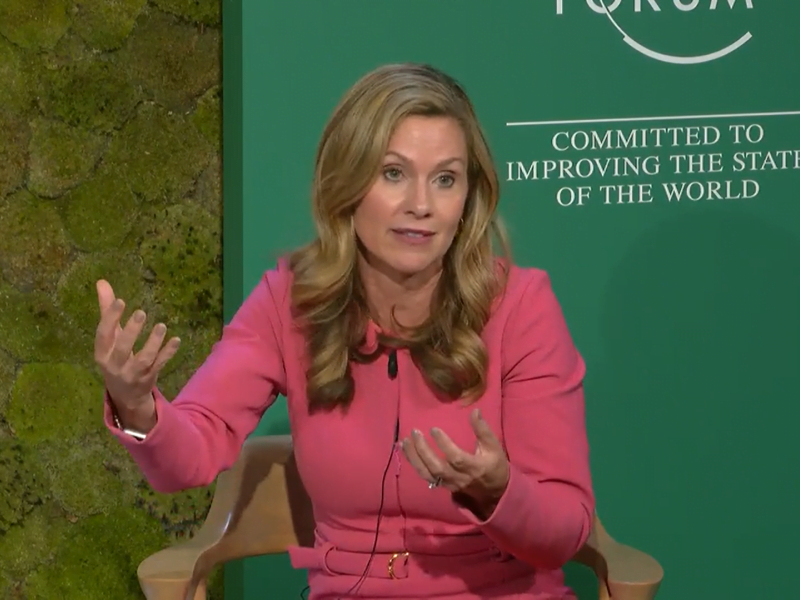Australia’s eSafety Commissioner Julie Inman Grant has called for greater international collaboration in regulating harms online, arguing that it also makes good business sense to do so.
Speaking at the World Economic Forum in Davos, Switzerland on Thursday (AEDT), Ms Inman Grant said action by the United States would probably lead to a “much safer online world” and noted that she has had discussions with the White House.
She suggested the US consider a self-regulatory scheme to encourage companies to consider safety, human centricity, and risk assessments in the design and deployment of their online services.
Ms Inman Grant added that she is encouraged to see that US-based gaming companies have already internalised this.
“I think the gaming companies are really recognising that user retention [through] safety by design, makes good business sense. They hold on to users when their platforms aren’t toxic,” she said.
“In fact, one of the gaming companies I met with at the end of the year has their trust and safety team in with the revenue generating area. It says if we have a better, more positive, safer, less toxic platform, we’re actually going to retain our gamers and users. So that gives me a bit of hope.”

Australia has its own self-regulation scheme in the form of the Social Media or Relevant Electronic Services Codes, which child welfare groups have recently criticised.
Ms Inman Grant also acknowledged that “the Biden administration has done some really important thinking” in the space.
“They’ve got the AI responsible rules and ethics. They did the US Future of Tech Commission, where they did look at the at… safety by design,” she said.
Looking forward, Ms Inman Grant argued that it’s “critical we have to anticipate the risks whether it’s generative AI [or] immersive technologies”.
“Haptic suits are being developed to simulate the feeling of bullet holes in online gaming. And you can imagine that a sexual assault in the metaverse will feel real and much more visceral. The emotional and psychological harms that that could cause will be tremendous,” she said.
“We need to get ahead of this and not let the metaverse happen to us. We need to shape it just like we shape cities to make them habitable. In urban planning, we put in green split spaces, we make sure that there are water supplies and crosswalks. We need to do the same thing for the metaverse.”
Social engineering and different forms of grooming are also becoming more serious, according to the eSafety Commissioner. She noted that one in eight pieces of child sexual abuse material is self-produced often under coercion.
“Young people in their bedrooms and bathrooms on their smartphones [are] being coerced into performing sexual acts. You can sometimes hear the parent’s voices in the next room. This is literally happening under their noses,” Ms Inman Grant said.
She also said that her office has received a 600 per cent increase in reports of online sexual extortion, particularly from “17 to 24 year old young men… being targeted by organised crime through sexual extortion”.
“This is happening globally — every country here. If we don’t band together and work to educate people, but also to tackle crime and to bring the industry along to help harden the defences, we’re fighting a losing battle.”
Last November, Ms Inman Grant joined her counterparts from Fiji, Ireland, and the United Kingdom to launch the Global Online Safety Regulators Network at a conference in Washington DC. The network provides “a forum to help us coordinate build capacity” and would help in “countering the stealth, the wealth, and the power of the largest companies in the world”.
“While we’re going to have differences in our regulatory schemes, there would be common values that drive us together. We want to prevent… regulatory fragmentation. We know that’s a challenge for the platforms as well.”
Ms Inman Grant also noted governments with online safety regulation in place have a responsibility to the Global South to “take what we’ve learned and to share where we can”.
During last year’s WEF annual meeting, Ms Inman Grant called on other countries to end the “era of technological exceptionalism” and regulate online harms as they would any other set of risks.
At the time she urged tech companies to be “assessing their risks and then building the protections in as a forethought rather than an afterthought. If you will, embedding those digital seatbelts and erecting those digital guardrails”.
Do you know more? Contact James Riley via Email.

